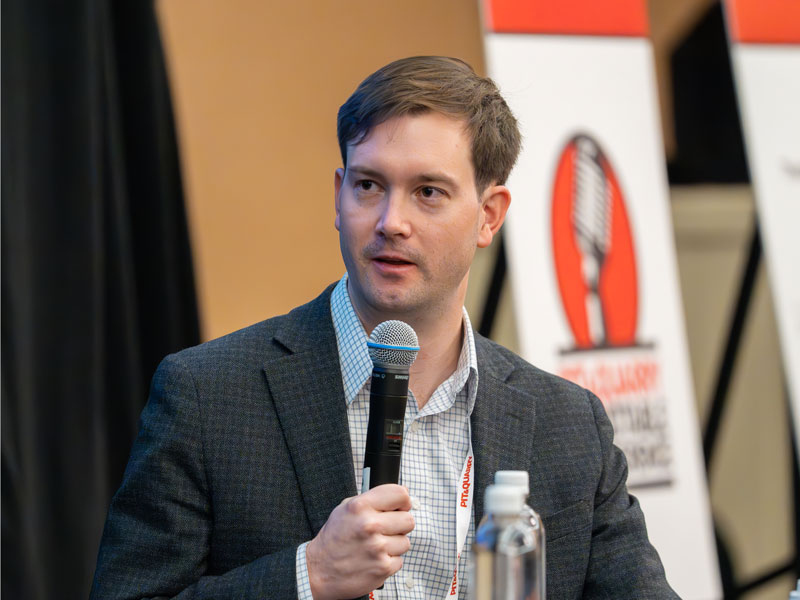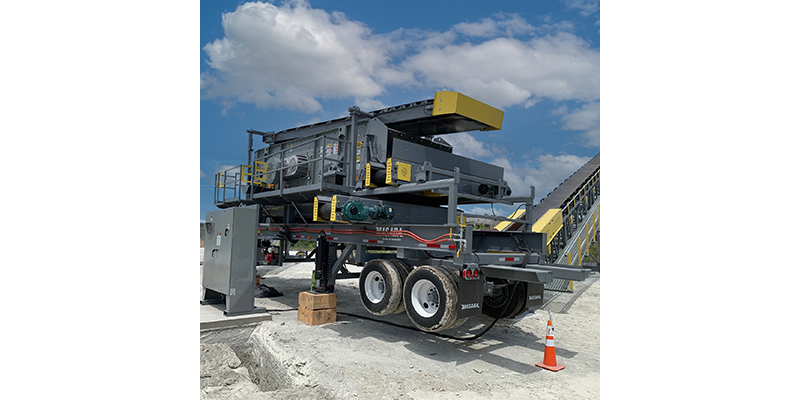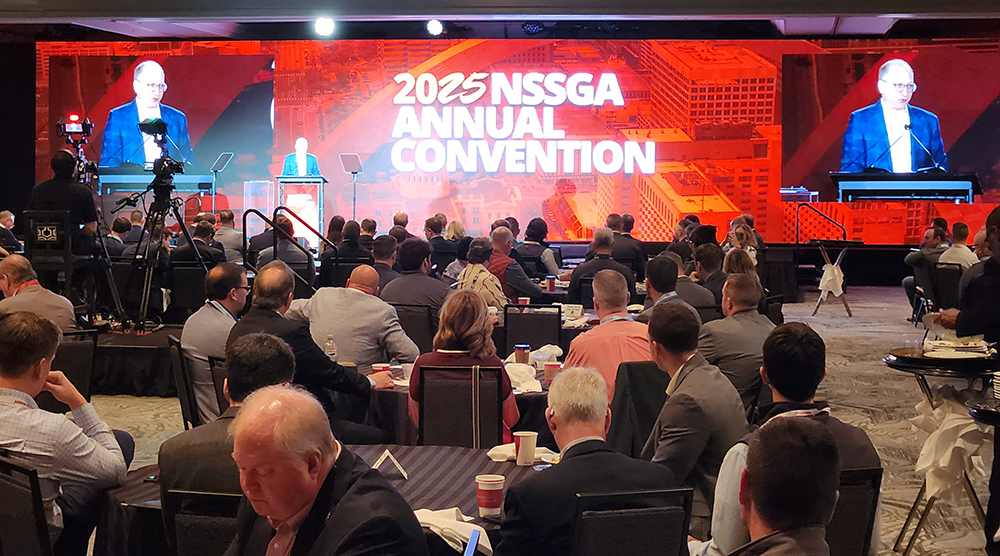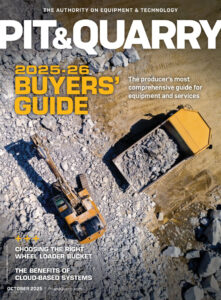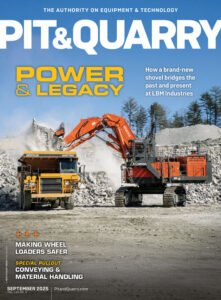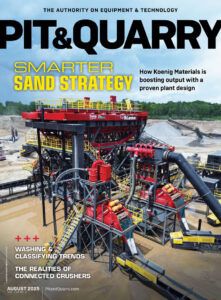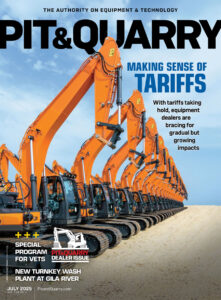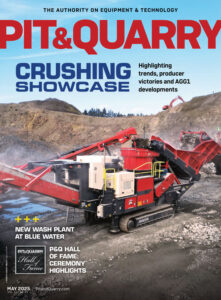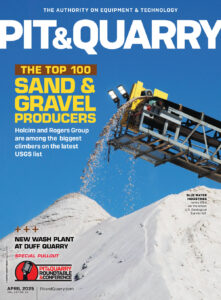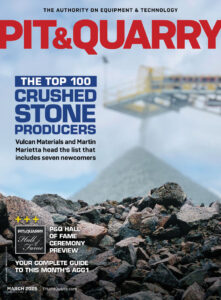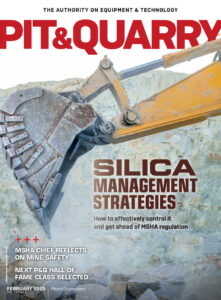Evan Bender, director of government affairs at the National Stone, Sand & Gravel Association, provided legislative and regulatory updates pertaining to the aggregate industry during the 2025 Pit & Quarry Roundtable & Conference. Bender discussed what could unfold in Washington with the Infrastructure Investment & Jobs Act (IIJA) expiring in 2026. He also touched on the workforce and a Mine Safety & Health Administration (MSHA) rule. The conversation here, which took place Jan. 31, was edited for brevity and clarity.
KEVIN YANIK (PIT & QUARRY): Frame the new political landscape for us as you see it in Washington and how it pertains to the interests of the aggregate industry.
EVAN BENDER (NSSGA): Obviously, we have a new administration that took office Jan. 20. The 119th Congress took office Jan. 3. It’s a Republican majority, 53-47, in the Senate. It’s much tighter in the House. It’ll drop to 217-215 at least for a couple months, meaning House Speaker Mike Johnson (R-Louisiana) won’t be able to lose a single vote for his party. It means they’ll have to pass everything on a partisan basis or work across the aisle.
NSSGA has identified two major bills that we see Congress considering: a tax bill through the budget reconciliation process, and then, in September 2026, the landmark Infrastructure Investment & Jobs Act expires, creating the need for a new infrastructure investment bill.
There’s a lot of new leadership. We know Sean Duffy, the new secretary of transportation, well and have a good relationship with him from his time in Congress. But there’s a lot of work we’re doing to make sure the aggregate industry is represented in the major upcoming bills.
YANIK: Based on what you’ve seen and heard in terms of messaging from the Trump administration, how do you feel the aggregate industry and our interests marry up with what the administration is trying to pursue?
BENDER: The president has listed some of his major priorities like energy, border control and taxes. I would put those in one broader basket.
A big deciding factor in the election was the economy. I think infrastructure investment and securing a comprehensive transportation network for the country falls squarely into supporting a strong economy.
The IIJA was signed under President Biden. The authorization for surface transportation before that was the FAST Act, which was signed in 2015 by President Obama. So, I have to think President Trump wants to put his footprint on our infrastructure development. I look forward to seeing that happen.
YANIK: How likely is it that we’ll see another multiyear bill of the IIJA-FAST Act mold?
BENDER: Well, it has to happen. I would say it’s very likely it has to happen. It’s a matter of when.
Between the FAST Act and IIJA, it took a one-year extension to bridge the gap. There are some key players in Washington who want to get an infrastructure bill done under the new leadership before the 2026 election. IIJA expires two months before the next federal election. Things slow down in Washington at that time. People are already starting to talk about drafting this bill, what’s going to be included and what’s not.
There are a variety of priorities we’re advocating for. The Highway Trust Fund is a major piece of it, as are materials neutrality and the ‘Buy America’ exclusion for aggregates.
YANIK: The industry scored a couple of ‘wins’ of late related to the ROCKS Act and the Congressional Aggregates Caucus. Can you bring us up to speed on those, share the value of each and what the goals of the two are?
BENDER: A provision of IIJA basically formed a federal working group among industry professionals to study the use of aggregates and recommend practices and policies to ensure continued access and ultimately maximize federal infrastructure funding. Rep. Greg Stanton (D-Arizona) was an author of the ROCKS Act, along with Rep. Troy Balderson (R-Ohio).
The Congressional Aggregates Caucus was an initiative we launched last year. Rep. Salud Carbajal (D-California) and Rep. Nick Langworthy (R-New York) are the two congressional chairmen of that. It’s about boosting visibility on the Hill for aggregates issues. We’re going to be building membership for it among members of Congress on both sides of the aisle. We’re going to be doing staff and congressional policy briefings on the Hill for aggregates. Once it heats up a bit in D.C., we plan on hosting a quarry tour for congressional staff in the spring or early summer.
YANIK: Let’s talk about workforce development. This is one area you’re focused on at NSSGA. Do you anticipate there being any desire to try to get something done legislatively to address the workforce issue that our industry continues to experience?
BENDER: At every NSSGA member site I’ve visited, people say they have trouble hiring folks. So, there’s a couple of legislative initiatives we’re looking at and excited about.
The Mining Schools Act is one. It passed the Senate last year, and it provides a new grant for mining schools to recruit new students into the career field.
Any legislation on career and technical education is a big bipartisan winner in Congress, as well. We hope to see some movement there. There’s a new House chairman on the Education & Workforce Committee: Tim Walberg (R-Michigan), who is also a new member to the Aggregates Caucus. We look forward to working with him on this.
We’ve got a Workforce Development Task Force at NSSGA that’s member driven, and I’m the liaison for it. There are a few cool new projects we’re working on geared toward job applicants, educating them about the industry.
YANIK: Let’s shift gears and discuss MSHA’s respirable crystalline silica rule. Some of your colleagues at NSSGA are focused on this rule. What can you share about this development and what’s ahead?
BENDER: It became a final rule in April 2024. It will become active in April 2026. Our team has been saying to our members to plan on it happening. Don’t get caught by surprise a year from now. It’s something we’re concerned about and engaging MSHA on.
We want our members to be compliant, and we want to ensure safety for our members under the rule. But we’re concerned about the feasibility of this rule and the education needed for our members, especially small producers, to become compliant.
More from Evan Bender: Drilling Deeper Bonus Episode: The Trump administration, a new Congress and aggregates

